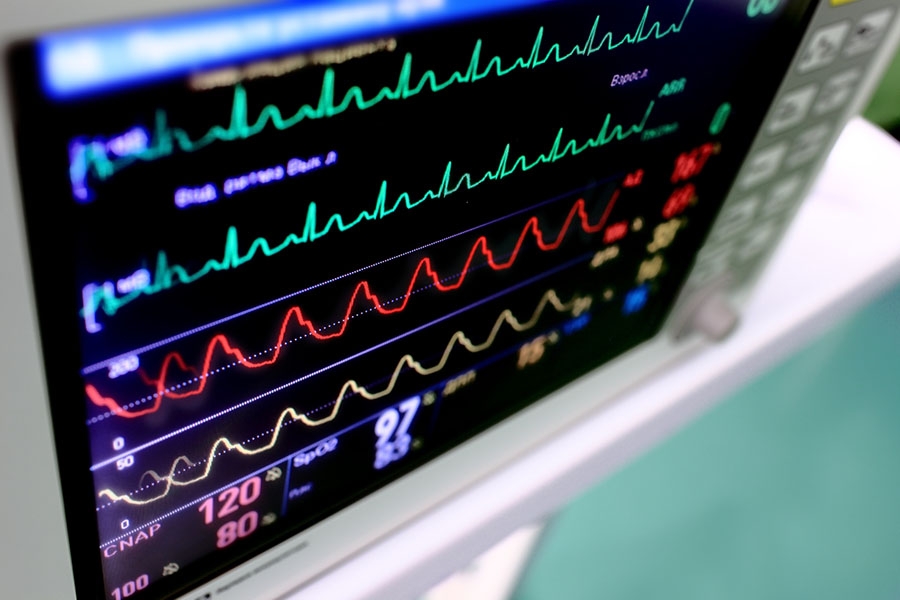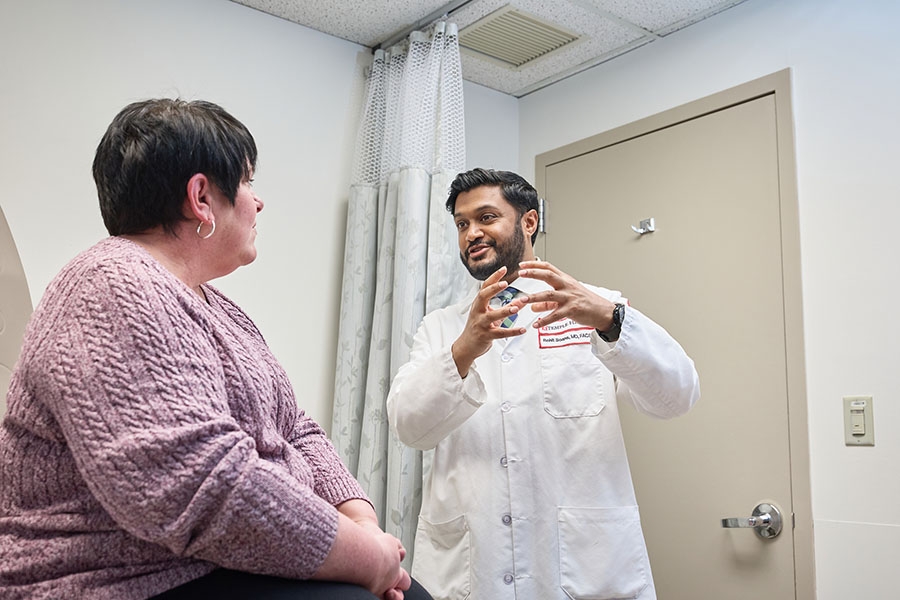Heart disease is the leading cause of death in the United States, and most heart disease is caused by coronary artery disease (CAD).
CAD occurs when the insides of the coronary arteries — the blood vessels that supply oxygen to the heart — become narrow or blocked by deposits of a fatty substance called plaque, restricting blood flow to the heart.
CAD can sneak up on you. It doesn’t always cause symptoms at first, and for some people, a heart attack is the initial sign that they have CAD.
Learning if you have CAD can help you and your doctor plan ways to prevent heart trouble before it starts so you can live your best, healthy life.
One way to diagnose CAD is with computed tomography (CT) coronary artery calcium (CAC) scoring, a powerful tool in preventive cardiology available at the Temple Preventive Cardiology & Integrative Heart Health Program. This test is quick, painless and noninvasive, and can provide you and your doctor with information. We can then use this information to tailor a healthy heart plan to help slow or potentially reverse the progression of CAD.
Here’s what I tell my patients about CT calcium scoring and why you might want to consider having it done.
Coronary calcification is a marker for heart disease
To understand calcium scoring, it helps to know what plaque is and how it forms inside the heart’s arteries. Plaque is made up of fat and cholesterol, substances that circulate in the bloodstream. Things like injury to a blood vessel, diabetes, smoking, and diet can cause plaque to develop. There are two types of plaque: noncalcified and calcified (hardened).
As plaque builds up, it can narrow the artery or even block it completely, which is what causes CAD and leads to heart attacks.
With calcium scoring, we can see plaque deposits before they cause symptoms.
Determining your calcium score
Calcium screening is a simple procedure. We obtain a cardiac CT scan using x-rays and computers to capture detailed images of the heart. We also conduct an electrocardiogram (ECG) at the same time to measure your heart’s electrical activity. This is done so that we can time the test to your heart’s beats, allowing us to image your heart when there is less motion, which gives us the clearest images of your heart.
The entire test takes less than 10 minutes, and the CT scan itself takes about 60 seconds. You don’t have to modify your diet or do anything to prepare for it. In addition, we don’t inject any contrast agent (substances similar to dyes to help highlight the body’s organs and improve the results of a medical imaging exam) into your bloodstream, so you won’t have an IV.
A calcium scan helps us predict your risk
After your scan, we count these areas of plaque and calculate a score based on other factors like your age, race/ethnicity, and gender. This allows us to identify that you have plaque and enables us to calculate your risk of having a heart attack or other cardiovascular event, such as a stroke. We can then compare to the general population to help understand your specific risk.
Coronary calcium scores are classified into one of the following categories based on the extent of plaque and the risk of heart disease:
- 0 — no calcification
- 1 to 10 — minimal calcification
- 11 to 100 — mild calcification
- 101 to 400 — moderate calcification
- Over 400 — severe calcification
At Temple, a cardiologist and radiologist read every coronary artery calcium scan and send a report to your primary care provider or cardiologist in about a week.
Your clinician then reviews the results of your scan with you.
You may find that you have no calcium in your coronary arteries, and that can be reassuring.
If, however, your scan shows that you have calcium deposits, you and your physician can develop a personalized treatment plan that can include lifestyle modifications and medication.
Calcium scoring allows us to look beyond traditional heart disease risk factors, such as high blood pressure, high cholesterol, and a high body weight, to help provide personalized treatments for our patients.
For example, at Temple we have guidelines for prescribing cholesterol-lowering statin medicines to help prevent heart attacks and strokes. Calcium scoring can help us better identify when these medications will be most beneficial. Statin therapy won’t eliminate calcified plaque from the coronary arteries, but it may help to reduce the amount of plaque and slow the progression of CAD.
Calcium scanning can also inform decisions about the overall care of our patients, giving us a greater picture of how we can help prevent cardiovascular events.
A heart scan can be a good motivator
If you feel healthy, it’s easy to think your heart is in good shape, especially if you don’t have any symptoms. But as I said, sometimes your first symptom of heart disease is a heart attack.
When I review calcium scores with my patients, I show them their scans, outlining the heart, coronary arteries, and the presence and extent of any plaque.
This can be an eye-opening experience. Often, my patients are motivated by their calcium scores to take control of their cardiovascular health to lower the chance of having a future heart attack or stroke.
Patients can take several steps to improve their heart health and help control their cardiovascular risk factors, such as high cholesterol and high blood pressure, including:
- Eating heart-healthy foods. Following a diet rich in fruits, vegetables, and lean protein and low in saturated and trans fats helps to minimize the build-up of plaque in the coronary arteries. Cutting down on fried and processed foods can also help improve your diet.
- Exercising regularly. Many people think they have to join a gym to get enough exercise to help their heart. But that isn’t the case. You’ll want to elevate your heart rate to the point where you’re breaking a sweat, and that’s actually easier to do than you may think. This can be done in the comfort of your own home using bodyweight exercises which are no cost to you, or even with resistance bands.
The American Heart Association and other groups recommend at least 150 minutes of moderate exercise a week. That can be broken up into small periods of exercise throughout the week, such as 30 minutes of exercise 5 days of the week. That can include brisk walking or the use of resistance bands, even from a seated position.
- Taking medications as directed, such as medication to help control blood pressure, cholesterol, and blood sugar levels, for example.
Who should get a coronary calcium scan?
I don’t recommend coronary artery CT scans for my patients who have been diagnosed with CAD or for those who have symptoms of CAD, like shortness of breath and chest pain. If you have any of these symptoms, you should see your doctor for an evaluation of your heart disease risk.
However, you may want to consider having a coronary calcium scan if, for instance, you have:
- A family history of premature heart disease, such as a heart attack in a family member before age 60.
- A low to intermediate risk of CAD based on an atherosclerotic cardiovascular disease (ASCVD) score or other risk calculation that your doctor can perform.
In addition to these indications, it’s worth having a discussion about calcium scoring with your primary care provider or a cardiologist if you’re generally concerned about your heart health. Your physician can help determine if a scan may be right for you.
Give your heart the love it deserves
The Temple Preventive Cardiology & Integrative Heart Health Program has experts in prevention and early detection who can help you improve your heart health with a treatment plan that’s tailored to your needs. Request an appointment with a Temple cardiologist or call 800-TEMPLE-MED today.


